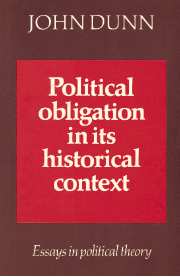2 - The identity of the history of ideas
Published online by Cambridge University Press: 22 August 2009
Summary
Two types of criticism are frequently levelled at the history of ideas in general and the history of political theory in particular. The first is very much that of historians practising in other fields; that it is written as a saga in which all the great deeds are done by entities which could not, in principle, do anything. In it, Science is always wrestling with Theology, Empiricism with Rationalism, monism with dualism, evolution with the Great Chain of Being, artifice with nature, Politik with political moralism. Its protagonists are never humans, but only reified abstractions – or, if humans by inadvertence, humans only as the loci of these abstractions. The other charge, one more frequently levelled by philosophers, is that it is insensitive to the distinctive features of ideas, unconcerned with, or more often ineffectual in its concern with, truth and falsehood, its products more like intellectual seed catalogues than adequate studies of thought. In short it is characterised by a persistent tension between the threats of falsity in its history and incompetence in its philosophy.
At first sight both these charges seem plausible. One might well suppose that the status of propositions about the history of thought would be at issue both in the accuracy of their location of a particular event in the past and in the adequacy of their understanding of the nature of the event so located.
- Type
- Chapter
- Information
- Political Obligation in its Historical ContextEssays in Political Theory, pp. 13 - 28Publisher: Cambridge University PressPrint publication year: 1980
- 6
- Cited by



